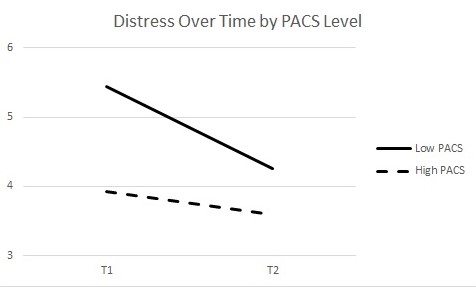Hematology/Oncology
Hematology/Oncology 2
162 - Distress in Caregivers of Children Referred to a Cancer Predisposition Syndromes Clinic
Publication Number: 162.22

Valdeoso Patterson, Jr. (he/him/his)
Clinical Research Coordinator
Nationwide Children's Hospital
Hilliard, Ohio, United States
Presenting Author(s)
Background:
Cancer predisposition syndromes (CPS) involve genetic risk factors for cancer developing at a rate higher than in the general population. Caregivers who pursue genetic testing for their children experience distress before appointments and higher anxiety levels before receiving results. Among adults with CPS, open family communication is related to less distress. Less is known about how caregiver distress may change over time in the context of genetic testing for CPS in children and moderators of these patterns.
Objective:
Our objectives are: 1) to examine how caregiver distress changes over time from before initial cancer genetics appointment (T1) to one-month later, following recommendation for testing and prior to receiving results (T2) and 2) to determine if there are differences in caregiver distress over time depending on the quality of parent-adolescent communication and recommendation for genetic testing.
Design/Methods:
Primary caregivers of children (Mage=9.12 years, SD=5.28) referred to cancer predisposition clinics at a large children’s hospital were invited to participate (N=66; 88% female; 79% White; n=24 recommended for genetic testing; n=15 received testing). At T1 and T2, caregivers completed the Distress Thermometer, an 11-point scale to measure distress. At T1, caregivers completed the Parent-Adolescent Communication Scale (PACS), a 20-item measure assessing quality of communication between parents and children. Repeated measure ANOVAs with listwise deletion were conducted to examine changes in caregiver distress and identify moderators of changes.
Results:
Caregiver distress significantly decreased from T1 (M=4.55, SD=2.67) to T2 (M=3.86, SD=2.16), F(1,64)=5.47, p=.02, η2=.08. (See Figure 1). Caregivers who reported more quality communication reported significantly lower distress (M=3.76, SD=.319) than caregivers who reported less quality communication (M=4.85, SD=.38), F(1,64)=4.82, p</em>=.03, η2=.07, with a non-significant time by communication interaction. There were no significant main or moderating effects for recommendation for testing.
Conclusion(s):
Although caregivers report moderate distress prior to their CPS appointment, they report significant declines in distress one-month later, which may not be impacted by recommendation for genetic testing. Parent-child communication may be associated with parental distress regarding CPS genetic testing in children. Clinicians should encourage developmentally appropriate communication between caregivers and children, and provide brief psychosocial intervention for caregivers in CPS clinic settings, especially at the initial appointment. 
